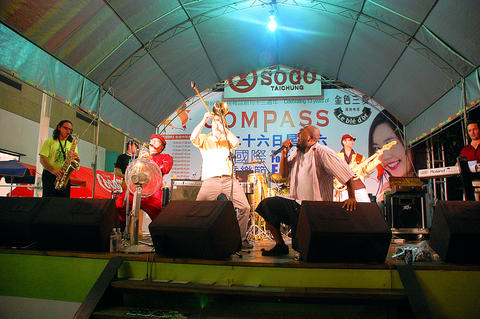Taichung's annual jazz festival started on a high note last weekend when tens of thousands of fans packed the city's leafy Jingguo Boulevard Parkway (經國綠園道) and Civil Square (市民廣場) to watch US saxophonist Eric Marienthal, Grammy-winning trumpeter Wallace Rooney, Brazilian fusion singer Flora Purim and other world-famous musicians in a series of outdoor concerts.
Now in its fifth year, the family-friendly Taichung Jazz Festival (台中爵士音樂節), which continues this weekend with performances by two-dozen local and international acts, is Taiwan's largest and most well-attended celebration of jazz music. According to the city's Cultural Affairs Bureau, total attendance at last year's five-day festival was 200,000. An organizer said this year's attendance could be as high as 250,000.
"People look forward to it all year because it is big, it's well-attended, and they bring some really good performers from overseas," said local jazz musician and club owner Patrick Byrne, whose funk group the Money Shot Horns will help close out the festival with a performance on Sunday. "It has a really nice festival vibe."

PHOTO: COURTESY OF THE MONEY SHOT HORNS
Byrne's club, Grooveyard, will host an informal after-party jam on Sunday that will be attended by Taiwan-based musicians and, he hopes, some of the festival's international performers he's invited. Other upcoming festival-related shows are at the Windsor Hotel (裕元花園酒店), which hosts Malaysia's Mr Gambus Band on Friday evening, and the Concession Music Restaurant (租界台中夜店), where Hong Kong's Eugene Pao Quintet (包以正五重奏) plays Friday night and Saxophoro from the Philippines appears along with the Mr Gambus Band on Saturday night.
The Windsor Hotel is also hosting a series of free music classes conducted by several of the festival's headliners. Eric Marienthal, Flora Purim and Airto Moreira taught classes last weekend. Wallace Roney, a protege of Miles Davis, will teach a trumpet class this coming Sunday from 1pm to 2:30pm in the hotel's Multipurpose Theater Hall. Those interested in participating should arrive 30 minutes in advance to register.
The Taichung Jazz Festival is organized by the city's Bureau of Cultural Affairs and aims to introduce a diverse selection of standards, fusion, salsa, swing and other jazz flavors to local audiences. Unlike similar events, the festival does not showcase other genres like rock or world music.
Concerts take place on three stages: Two have been erected along the Jingguo Boulevard Parkway between Taichung Civil Square (市民廣場) on Gongyi Road (公益路) and the Hotel National on Chunggang Road (中港路). The festival's third and main stage is located in Civil Square and hosts evening performances by the biggest acts. Dozens of street stalls selling food, music and jazz-related merchandize have been set up along Jingguo Boulevard Parkway.
Remaining performances are scheduled for Friday, from 6pm to 10pm, and on Saturday and Sunday, from 3pm to 10pm. Among the local acts to look out for are Les Chats Noirs, who play jazz, blues and hot club de France-style tunes, the Major Huang Trio (黃盟傑爵士鋼琴聯盟), who play intricately arranged standards, and the Money Shot Horns, a new Taichung-based funk supergroup composed of current or former members of Milk, Boogie Chillin', the Anglers, the Sound Clashes, Ad Hoc and Les Chats Noirs.
Admission to the festival is free of charge, but audiences are encouraged to arrive early to get good seats. Log on at the bilingual Web site www.jazzfestival.com.tw for times and locations of all acts as well as additional information about this year's festival. Visit www.grooveyardtaiwan.com for more information about Sunday's after-jam session at Groovyeard.

June 23 to June 29 After capturing the walled city of Hsinchu on June 22, 1895, the Japanese hoped to quickly push south and seize control of Taiwan’s entire west coast — but their advance was stalled for more than a month. Not only did local Hakka fighters continue to cause them headaches, resistance forces even attempted to retake the city three times. “We had planned to occupy Anping (Tainan) and Takao (Kaohsiung) as soon as possible, but ever since we took Hsinchu, nearby bandits proclaiming to be ‘righteous people’ (義民) have been destroying train tracks and electrical cables, and gathering in villages

Dr. Y. Tony Yang, Associate Dean of Health Policy and Population Science at George Washington University, argued last week in a piece for the Taipei Times about former president Ma Ying-jeou (馬英九) leading a student delegation to the People’s Republic of China (PRC) that, “The real question is not whether Ma’s visit helps or hurts Taiwan — it is why Taiwan lacks a sophisticated, multi-track approach to one of the most complex geopolitical relationships in the world” (“Ma’s Visit, DPP’s Blind Spot,” June 18, page 8). Yang contends that the Democratic Progressive Party (DPP) has a blind spot: “By treating any

Swooping low over the banks of a Nile River tributary, an aid flight run by retired American military officers released a stream of food-stuffed sacks over a town emptied by fighting in South Sudan, a country wracked by conflict. Last week’s air drop was the latest in a controversial development — private contracting firms led by former US intelligence officers and military veterans delivering aid to some of the world’s deadliest conflict zones, in operations organized with governments that are combatants in the conflicts. The moves are roiling the global aid community, which warns of a more militarized, politicized and profit-seeking trend

This year will go down in the history books. Taiwan faces enormous turmoil and uncertainty in the coming months. Which political parties are in a good position to handle big changes? All of the main parties are beset with challenges. Taking stock, this column examined the Taiwan People’s Party (TPP) (“Huang Kuo-chang’s choking the life out of the TPP,” May 28, page 12), the Democratic Progressive Party (DPP) (“Challenges amid choppy waters for the DPP,” June 14, page 12) and the Chinese Nationalist Party (KMT) (“KMT struggles to seize opportunities as ‘interesting times’ loom,” June 20, page 11). Times like these can